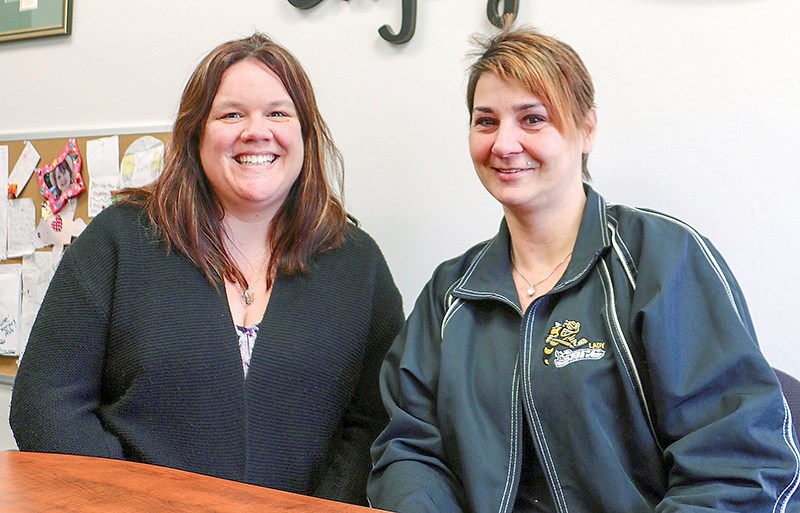Tara Jeffrey
Ann Laforge had every reason to give up on herself.
“My mother couldn’t raise me, and I was always told I was never wanted,” says the 41-year-old Sarnia woman, recalling a pained childhood.
She’s telling her story in a quiet room at the Sarnia-Lambton Children’s Aid Society. It’s an agency she became all too familiar with over the years, yet remarkably one she’s about to begin working with.
As a girl Laforge was in and out of foster and kin care and the Girls’ Home, and wound up pregnant at 15. Her son was placed in the home of his paternal grandparents.
“I was an alcoholic at the time,” she admits. “I continued that for many years.”
At 19, she gave birth to another son, and two years later, a third, she says.
“That’s when I met my husband.”
Laforge trembles as she recalls the ‘toxic relationship’ with the man she married in 1996. They had a daughter together that same year.
“If he showed up with a beer and cowboy boots on, I knew I had to get a bottle of whiskey into me so it wouldn’t hurt as much,” she says. “I was what you would call a functioning alcoholic in a violent marriage.
“When I finally left my husband, it just gave me an excuse to drink more.”
Relationships with other violent men followed, Laforge says, fighting back tears.
“My children witnessed too much.”
Knowing she couldn’t care for her three kids, Laforge reached out to the CAS. Her oldest son went into care; her daughter went to live with her father.
“She was gone for seven years; he wouldn’t let me see her,” she recalls, adding her other son was eventually placed into care as well.
“That’s when I became a full-blown drug addict.”
Her seven-year drug binge included crack cocaine and intravenous drugs. Eventually, she was denied access to her sons, who, as they grew older, refused to see her until she was clean.
Rock bottom came for Laforge when she was thrown in jail for two-and-a-half-months.
“It ruined my life,” she says.
But it also saved her, because that’s when she got sober.
“I lost a lot of things and a lot of people. But I’m so fortunate that I came out with my life.”
She started going to meetings and even went back to college and earned her diploma.
She has been clean from the hard drugs for nine years now and sober for two-and-a-half-years. Today, she works three-part time jobs. Because of her criminal record, Laforge is unable to work in her chosen field - developmental services worker - a diploma she earned in honour of her mother, who was mentally challenged.
And though it’s been a struggle Laforge has re-established a relationship with all of her children, including her daughter, who, like Ann, had a baby at 16.
Laforge is now the legal guardian of her grandchild.
“She most definitely has changed my life,” says Laforge. “It’s really been a full circle thing.”
She’s also strengthened her relationship with the CAS, volunteering to tell her story to prospective foster parents through the agency’s PRIDE training. Often, she is joined by one of her sons, who speaks about his experience from the child’s perspective.
It’s a difficult thing to do, but also healing for both of them.
CAS resource worker Heather McKinlay has worked closely with Laforge for several years.
“This is the first time a biological parent has come to share their story, and it’s really quite powerful,” she says.
McKinlay points to a major shift within the agency to strengthen the relationship between birth and foster families.
“It humanizes the experiences of birth moms and sets up expectations for putting families back together,” she said.
It’s not all about ‘rescuing’ kids from bad parents, she adds.
“And it really puts a human face to it.”
There are currently 93 children living with 65 families providing kinship care in Sarnia-Lambton, says executive director Dawn Flegel, pointing to grandparents, aunts, uncles, and other family members.
She passes a contract across the table to Laforge, who will officially begin work with the agency in April. She will co-lead a new initiative called the Family Feedback Project, gathering input from birth families.
“We need to hear those voices louder and better serve them,” Flegel says of the project. “We need to better understand these stories of poverty, addiction, domestic violence, from the people who live it.”
It’s going to shape the way the agency moves forward, and Laforge says she’s proud to be a part of it.
“Kids really do belong with their birth families,” she said. “If we can help them get there, that’s where they need to be.”
Any families interested in being involved with the Family Feedback Project can contact the Sarnia-Lambton Children’s Aid Society at 519-336-0623.
